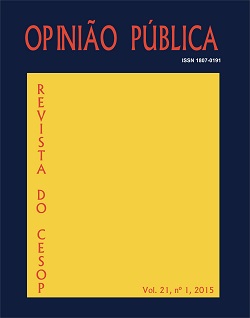Resumo
Neste artigo mostramos que as mudanças na base de apoio a Lula, que se tornam mais evidentes nas eleições de 2006, são mais bem explicadas por variáveis políticas. Para isso recorremos a uma base de dados original, agregada por seção eleitoral, e estendemos a análise incluindo outros partidos e as eleições que precederam aquele pleito. Por um lado, uma explicação do que houve em 2006 precisa dar conta do que ocorreu em 2002, quando o PT chega à presidência. Por outro lado, dado o caráter composicional do voto, a razão do que ocorre com os votos do PT deve explicar o que acontece com os votos de seus adversários. Observamos que o sucesso do PT e a ampliação de sua base a partir de 2006 acontecem após a implosão do PSDB em 2002 e a ausência de adversários competitivos. As explicações que associam o novo padrão de voto em Lula com sua chegada ao poder não dão conta dessas dinâmicas. Sugerimos que um melhor esclarecimento deve privilegiar as estratégias de coordenação pré-eleitoral adotadas pelos partidos.
Abstract:
In this article we show that changes in the support base for Lula that become more evident in the 2006 elections are best explained by political variables. For this we turn to an original database, aggregated at the ballot station level, and we extend the analysis including other parties and elections preceding that election. On the one hand, an explanation of what happened in 2006 needs to explain what happened in 2002, which is when the PT reaches the presidency. On the other hand, given the compositional character of the vote, the explanation of what happens to the votes of the PT should explain what happens to the votes of his opponents. We note that the success of the PT and the expansion of its base from 2006 occur after the implosion of the PSDB in 2002 and the absence of competitive opponents. Explanations based on the advantages brought by the coming of PT to power do not give an accurate account of these dynamics. We suggest that a better explanation should focus on the preeelection coordination strategies adopted by the parties.
Keywords: presidential elections; electoral competition; parties; electoral coordination; Worker’s Party; Brazilian Social Democracy Party
Referências
BARBOSA, M. E. F. Modelo multinível. [online], 2001. Disponível em:
<http://www.fcc.org.br/pesquisa/publicacoes/eae/arquivos/1128/1128.pdf>. Acesso em: 13 fev. 2015.
CARRARO, A., et al. “É a economia, companheiro! Uma análise empírica da reeleição de Lula com base em dados municipais”. Unpubl. Working Paper, Ibemec, 2007.
COX, G. W. "Electoral institutions and political competition: coordination, persuasion and mobilization". Handbook of New Institutional Economics. Springer Berlin Heidelberg, p. 69-89, 2008.
COX, G. W. Swing voters, core voters, and distributive politics. In: SHAPIRO, I., et al. Political representation. Cambridge University Press, 2009.
GELMAN, A.; HILL, J. Data analysis using regression and multilevel/hierarchical models. Cambridge University Press,
HUNTER, W.; POWER, T. J. “Rewarding Lula: Executive Power, social policy, and the Brazilian elections of 2006”. Latin American Politics and Society, vol. 49, nº 1, p. 1-30, 2007.
IMAI, K.; KING, G.; LAU, O. “Zelig: everyone’s statistical software”. R Package version 3.5, 2009.
KING, G., et al. “Ordinary economic voting behavior in the extraordinary election of Adolf Hitler”. Journal of Economic History, vol. 68, nº 4, p. 951-996, 2008.
LIMONGI, F.; GUARNIERI, F. “A base e os partidos: as eleições presidenciais no Brasil pós-redemocratização”. Novos Estudos
Cebrap, nº 99, p. 5-24, 2014.
NICOLAU, J.; PEIXOTO, V. "As bases municipais da votação de Lula em 2006: Instituto Nacional de Altos Estudos". Cadernos do Fórum Nacional, p. 15-25, 2007.
SAMUELS, D. “Sources of mass partisanship in Brazil”. Latin American Politics and Society, vol. 48, nº 2, p. 1-27, 2006.
SOARES, G. A. D.; TERRON, S. L. "Dois Lulas: a geografia eleitoral da reeleição (explorando conceitos, métodos e técnicas de análise geoespacial)". Opinião Pública, vol. 14, nº 2, p. 269-301, 2008.
TOMZ, M.; TUCKER, J. A.; WITTENBERG, J. "An easy and accurate regression model for multiparty electoral data". Political Analysis, vol. 10, nº 1, p. 66-83, 2002.
ZUCCO, C. "The president's new Constituency: Lula and the pragmatic vote in Brazil's 2006 presidential elections". Journal of Latin American Studies, vol. 40, nº 1, p. 29, 2008.
ZUCCO, C. “When payouts pay off: conditional cash transfer and voting behavior in Brazil 2002-2010”. American Journal of Political Science, vol. 57, nº 4, p. 810-822, 2013.
A Opinião Pública utiliza a licença do Creative Commons (CC), preservando assim, a integridade dos artigos em ambiente de acesso aberto.

